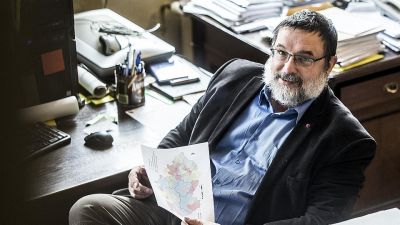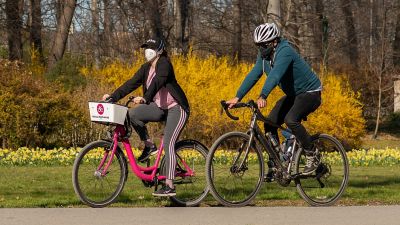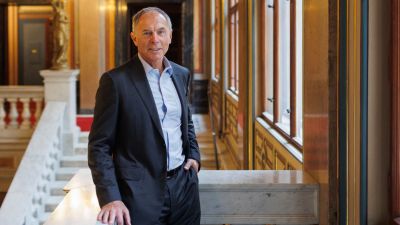Václav Smil is a world-famous author, science communicator and graduate of the Faculty of Science of Charles University. This week he made a special appearance at his alma mater and the Czech Geographical Society. Attendees, including students and colleagues, gathered at a crowded auditorium at Albertov for a glimpse.

Václav Smil, a favourite author of Bill Gates, at CU, together with the Dean of the Faculty of Arts, Jiří Zima, and the Vice-Rector Jan Kuklík.
The small, unassuming man and author of five dozen books returned to his alma mater this Tuesday where he once studied economic geography. Smil is much-sought as a guest worldwide, so there was something special about this return. “The professor is changing insights in accepted patterns of thinking in the areas of energy, the environment, population development, food production and technical innovation. His work is incredible," says Radim Perlín, the chairman of the Academic Senate of the Faculty of Science, who emceed the event.


Václav Smil receives a commemorative award from Jan Kuklík. Dean Jiří Zima presented the silver medal on behalf of the faculty.
The first award that Professor Smil received was a commemorative gold medal. It was presented to the scientist by Jan Kuklík, CU’s Vice-Rector for Academic Qualifications. “It is extremely important to appreciate the work of our graduates who were forced to leave by the [former Communist] regime and yet they maintained Czech ties and ties to their alma mater,” Kuklík said.
Professor Jiří Zima, Dean of the Faculty of Science at Charles University, presented the famous alumni with a silver medal from his home faculty and at the same time expressed satisfaction and joy at his visit to Charles University.


Before the lecture hall became a scene of an engaging discussion, Smil was presented with a plaque by Pavel Chromý.
The President of the Czech Geographical Society, Associate Professor Pavel Chromý, greeted Václav Smil on behalf of all Czech geographers and presented the scientist with a commemorative plaque.
“It is actually depressing for me to receive awards that are given at the end of life,” Václav Smil began his speech. “I am a totally non-nostalgic person. So as soon as I get home, I'll start writing my next publication. I am also very self-critical, I have no illusions about myself. I do what I can do, and especially when I know that no one has done it before me.” Work, clearly, is a given for the professor emeritus: age is no reason to slow down. Forum magazine also attended the event and was able to listen in as Professor Václav Smil shared remarks with members of the audience.
On globalisation
“Even today, people don't want to admit how globalised they are. Yes, they know that globalisation is here, but they don't realise how deep it goes. Okay, it has paused a little and started to decline slightly, but not because of Covid or America-China relations. People have simply started to realise that it is not worth importing every roll of toilet paper from China and socks from India. There is a natural limit to globalisation.”
“Fifty years ago, you would have bought a Honda in Japan - with eighty percent of the parts made in Japan. Twenty years ago, the same machine was for sale in Quebec made from parts mostly made in Canada, the U. S. and Europe and assembled in Quebec only under Japanese supervision. Today, unfortunately, all production is concentrated in Mexico, where the value of labour is almost nil.”
“Illegal refugees from Africa - Nigeria, Cameroon - produce ninety-five percent of Europe's vegetables in southern Spain and Italy. While fruit and vegetable growing used to be a local issue, the fields were located within a radius of no more than a hundred kilometres. And chamomile? One hundred percent of chamomile tea comes from Egypt.”
About electromobility
“Before World War II, cars had one servo motor, it was there to get you started. Today, in addition to the starter, it has up to forty other little motors: for the mirrors, the seats, the windows... And an electric car? The heart of the electric car is copper, most of the copper comes from Chile. Only the ore travels across the Pacific to China, where it is refined and shipped by ship around the world. Want to know how fast electro-mobilisation will progress? Decarbonising cars by 2030 is nonsense.”
 “There is no single country that has everything. Disproportionately, China and Russia have far more scarce raw materials and resources than the European Union and the United States combined."
“There is no single country that has everything. Disproportionately, China and Russia have far more scarce raw materials and resources than the European Union and the United States combined."
About China
“China has purchased the largest ammonium factories in the United States, Germany, and the Netherlands, and has become the largest producer of nitrogen fertilizer in the world, as well as an applicator. It needed to increase its yield to feed its population. China's success is actually the cumulative effect of Western investment, something that has never happened before in human history.”
“Long-term forecasting is pointless; we can only make very good guesses about what is possible and impossible. But what we can predict quite well is population development. China, unlike other countries, has a problem with a declining birth rate: it starts to age before it becomes really rich. You know, when people get used to having a big Mercedes, they don't want to have any children.”

Questions to the distinguished guest were posed by, among others, the Dean of the Faculty of Arts of the Charles University, Jiří Zima.
“What can I say that is positive to my grandchildren when they ask about the future of Europe?”, the dean asked during the discussion opening up further space for a flurry of thought-provoking arguments. “I don't know, I should probably stop lecturing so as not to appear so depressing,” responded Smil. He continued: “We - we, meaning the people of Western civilization - live on such a level that a rational person must be ashamed of everything. We waste, disfigure and destroy everything.”
About food and tourism
“Roughly forty percent of the food that we laboriously produce, we throw away. And sixty percent of the harvest we use to feed animals. I'm not an activist, I'm not going to tell you not to eat meat. A healthy human diet is all about variety, and meat should not be absent from the diet. But do we need to eat more meat in a year than we weigh? I've been cooking daily for forty years and I eat meat once a week at most. If only we could reduce our meat consumption, how much we could save the biosphere!”
On hope
“Everything is similar to religious faith: it too is not open to rational argument. There are two billion people in the world who believe in immaculate conception and that the end of the world will come in 2030, which is what the UN Secretary-General claims… There is hope, of course, people are seeing and realising the state of the country and society, because in the last three years the situation has already started to turn around, we are starting to look at things more realistically.”
And what did Professor Václav Smil recommend to the scientists present before he signed his books and added many personal dedications to his readers and admirers before he left?
“Know physics, chemistry, biology and algebra at the kindergarten level. Sadly, most of the people who run this world don't know them. Pick a random politician and let him solve an equation, he won't be able to. Ask him how much this or that metal weighs, or what the average rainfall in Bohemia is, or how the soil erodes when wheat is grown, or what the daily protein requirement is for human life. People do not know the basic things of life. If they knew them, the world could not be where it is.” Professor Václav Smil said.
| Professor Václav Smil |
| Václav Smil is a Canadian scientist of Czech origin. A graduate of the Faculty of Science of Charles University in the field of economic geography at the Department of Economic Geography (now the Department of Social Geography and Regional Development at the Faculty of Science of Charles University), Professor Emeritus at the University of Manitoba in Winnipeg, Canada. Smil is a Fellow of the Royal Society for the Improvement of Natural Knowledge, and a recipient of the Order of Canada, Canada's second highest honour, and the American Association for the Advancement of Science Award for the Popularization of Science and Technology. According to Foreign Policy , he is one of the 100 most influential people in the world and has been named one of the most inspiring intellectuals of our time by Microsoft founder Bill Gates (source: Wikipedia), often quoted on the cover of his books. He is the author of five dozen books, mostly focused on energy and the environment, most of which became bestsellers soon after their publication. It was only in 2017 that Smil's books began to be published in Czech, exclusively by Kniha Zlín. |


























